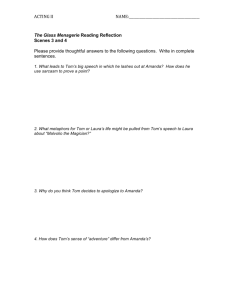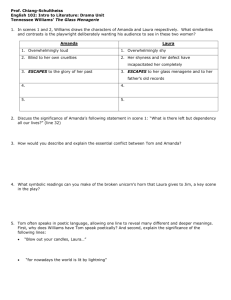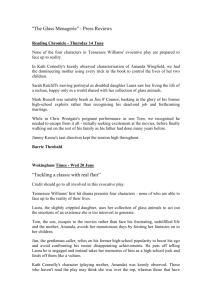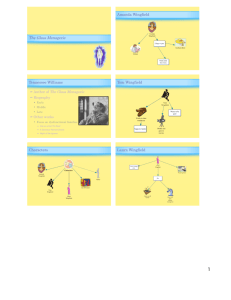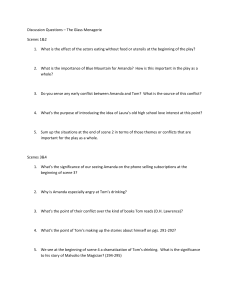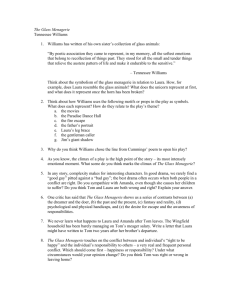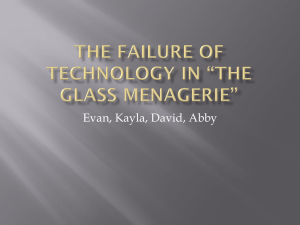THE GLASS MENAGERIE Tests\374
advertisement
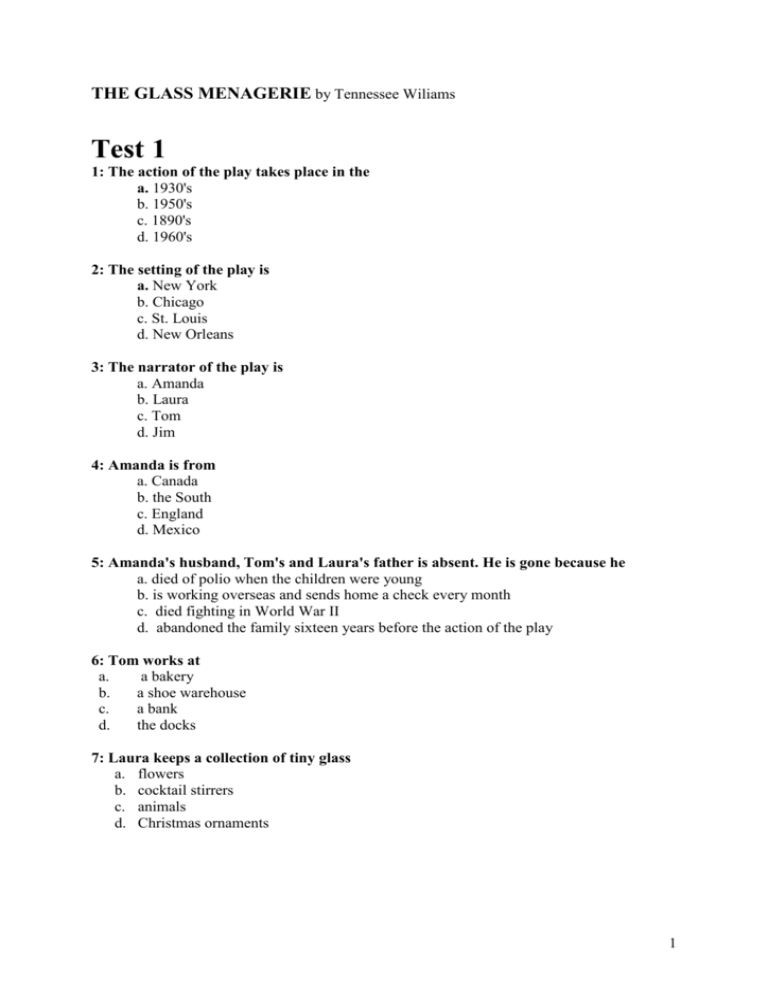
THE GLASS MENAGERIE by Tennessee Wiliams Test 1 1: The action of the play takes place in the a. 1930's b. 1950's c. 1890's d. 1960's 2: The setting of the play is a. New York b. Chicago c. St. Louis d. New Orleans 3: The narrator of the play is a. Amanda b. Laura c. Tom d. Jim 4: Amanda is from a. Canada b. the South c. England d. Mexico 5: Amanda's husband, Tom's and Laura's father is absent. He is gone because he a. died of polio when the children were young b. is working overseas and sends home a check every month c. died fighting in World War II d. abandoned the family sixteen years before the action of the play 6: Tom works at a. a bakery b. a shoe warehouse c. a bank d. the docks 7: Laura keeps a collection of tiny glass a. flowers b. cocktail stirrers c. animals d. Christmas ornaments 1 8: In his first speech, Tom makes an allusion to a certain atrocity in Europe. That atrocity is mentioned several times by Tom throughout the play. What event does Tom refer to? a. Guernica b. Stalin's extermination of the Armenians c. the Holocaust d. the Rape of Nanking 9: Tom frequently addresses the audience from a certain part of the set. This area is an important symbol for Tom and for the choice he faces. What area is it? a. the chimney b. Paradise Dance Hall c. the bedroom d. the fire escape 10: Tom spends many of his nights at a. the warehouse b. the movies d. opium dens e. church 11: In the first scene, Amanda tells the story of a Sunday afternoon in Blue Mountain when she received seventeen a. bouquets of flowers b. Jehovah's Witnesses c. gentleman callers d. letters of recommendation 12: How is Laura physically handicapped? a. She has a lame leg. b. She has a lame arm c. She is autistic. d. She is blind. 13: Amanda enrolled Laura at a. Radcliffe College b. Rubicam's Business College c. Goldsmith's School of Fine Arts d. Missouri State 14: Laura stopped going to class because a. she was ethically opposed to capitalism b. the classes terrified her, to the point of making her physically ill c. one of the teachers sexually harassed her d. she saw how work had embittered Tom 2 15: Because Laura's nerves cannot handle class, Amanda becomes all the more determined to a. win the lottery b. open her own business c. find a husband for Laura d. find Laura's long-lost father 16: Instead of going to class, Laura spent her days a. wandering in the park and in museums b. working as a prostitute c. with an old friend of hers from high school d. hiding with Tom at the warehouse 17: Amanda, realizing that it will take money to make the apartment presentable for a gentleman caller, takes a second job a. at the shoe warehouse b. roping in subscribers for The Homemaker's Companion c. at a restaurant d. at the local hospital 18: Back when she was in high school, Laura had a crush on a boy named Jim. He used to call her a. Miss Wingfield b. Li'l Amanda c. Glass Menagerie Girl d. Blue Roses 19: Amanda never allows Laura or Tom to describe Laura's condition using the word a. crippled b. lame c. retarded d. unusual 20: Amanda confiscates Tom's books and returns them to the library. These books included a novel that Amanda thought was objectionable, a novel by a. James Joyce b. D.H. Lawrence c. William Faulkner d. Virginia Woolf 21: Tom goes to a magician. The magician's most impressive trick was a. pulling a glass animal out of a hat b. making himself disappear c. escaping from a coffin without removing a single nail d. turning water into whiskey 22: The magician's most impressive trick symbolizes a. Laura's fragility b. the truth about the Wingfield father's motives c. Tom's hopeless wish that he could escape without doing anyone any harm d. Tom's alcoholism 3 23: When Laura leaves to go get butter a. she is accosted by a mugger, the attack symbolizing her vulnerability to predatory men b. she forgets the way home, indicating that she is experiencing the first symptoms of insanity c. she has a horrible nervous breakdown, showing how incapable she is of coping with other people d. she stumbles on the fire escape, her fall symbolizing her inability to cope with the world outside the tiny apartment 24: As he takes his morning coffee, Tom apologizes to his mother. He refuses to eat any of the food she offers, possibly because a. he is still angry with her and wants to send her a message b. he fears the food is poisoned c. he is on a diet d. he is hung over 25: Amanda senses that Tom wants to leave home. She tells him he can do it as soon as a. they have found a husband for Laura b. they have saved up two thousand dollars c. Amanda has started her business d. both a and b 26: Tom's predicament is one of the themes of the play. This theme could best be described as a. the battle between the sexes b. the conflict between responsibility for one's family and the need to live one's own life c. the conflict between Christian faith and science d. the conflict between cynical apathy and the need for political 27: Across the alley from the Wingfield apartment is the a. Holy Trinity church b. Paradise Dance Hall c. Mukilteo Dance Hall d. Paradise Bowling Alley 28: The place that is the correct answer to question 27 has a symbolic name. In the play, this name symbolizes, among other things, a. the conflict between Christian faith and science b. innocence lost and illusory hopes and dreams c. primal power that existed before the arrival of the white man d. Tom's dreams of a career as a professional bowler 29: On the fire escape, Amanda and Tom make wishes on the moon. Then Tom gives her some good news: a. he has found a gentleman caller for Laura b. he has saved up two thousand dollars c. he has found an investor who will help them start their new business d. both a and b 4 30: Amanda drills Tom about the good news. She is particularly concerned that a. Jim might be a drunkard b. Jim might be Jewish c. the money won't be enough d. their new business will draw a seedy crowd 31: Tom worries that a. Jim might think Laura is peculiar b. Jim might not have as much money as he claims c. Amanda won't live up to her part of the bargain d. the situation in Spain will escalate 32: When Amanda tells Laura to wish on the moon, the language she uses to describe the moon alludes to which fairy tale? a. Snow White b. Rapunzel c. Sleeping Beauty d. Cinderella 33: Jim's nickname for Tom is a. Killer b. El Diablo c. Shakespeare d. Tennessee 34: Before Jim's arrival, Amanda tells Laura to a. change into a purple dress b. stuff her bra c. go out and buy some wine both b and c 35: For the big event, Amanda wears a. a new gown bought for a huge sum from a catalogue b. a black hat c. a girlish dress from her youth d. a pair of white gloves 36: From Amanda's behavior before and during Jim's arrival, we can see that a. she longs to relive her youth b. she is an exorbitant spender c. she has a passion for politics d. she is too attached to the glass menagerie 37: The glass menagerie is a symbol for which character? a. Jim b. Tom c. Amanda d. Laura 5 38: Jim kisses Laura, but he has some distressing news afterward. What does he tell her? a. he has cancer b. he is enlisting in the navy c. he is engaged d. he is joining the priesthood 39: In Tom's final speech to the audience, he reveals that a. he stayed with Amanda and Laura until Laura died a year later b. he remained friends with Jim, who was killed during World War II c. Amanda's business failed and the family had to leave St. Louis d. he left Amanda and Laura but the memory of them still haunts him 40: The Glass Menagerie could best be described as a. a Christian allegory, in the tradition of Pilgrim's Progress b. a gender-bending meditation on race and sexuality as social constructions c. a "memory play" that uses projections, lighting, and music to create a dream-like atmosphere d. a naturalistic drama 6 Test 2 1. a) b) c) Amanda frequently talks about her husband because she still loves him in spite of the fact that he deserted her fears that Tom will turn out to be like him wants her children to know their family heritage 2. The setting of The Glass Menagerie is unrealistic because I. it exists only in Tom's imagination II. it is intended to be symbolic III. Tom's memory of the details has faded a) I, II and III b) I and III only c) II and III only 3. Amanda recalls the gentlemen callers of the past whenever a) the present becomes too painful to bear b) she wants to impress others with her social background c) Tom insults her 4. Laura usually listens to her mother's stories of Blue Mountain because she a) enjoys hearing them b) wants Amanda to enjoy recalling her girlhood c) expects to learn how to be popular 5. Tom goes to the movies to I. get away from Amanda II. find adventure III. compensate for the boredom of his life a) I, II and IIII b) I and II only c) II and III only 6. Amanda and Tom get into an argument over a) Tom's reading habits b) money c) Tom's indifference to Laura 7. Tom chooses to invite Jim O'Connor to meet Laura because a) Jim and Laura knew each other in high school b) he can't think of anyone else c) he owes Jim a favor 8. The Paradise Dance Hall contributes to the play as a I. symbol for temporary and illusory happiness II. sign of the neighborhood's run-down condition III. source of background music a) I and III only b) II and III only c) I, II, and III 7 9. Laura gives Jim the broken unicorn because a) she doesn't want him to forget her b) she's grateful for his kindness c) she wants him to have a wedding gift 10. Tom refers to cities as "dead leaves" ——— because a) they have no meaning to him b) they have been destroyed by World War II c) Laura is not with him 11. Why is The Glass Menagerie an appropriate title for this play? 12. Does this play have a villain? Explain. 13. To what extent is Tom responsible for his "two-by-four situation"? 14. Laura recalls how self-conscious she felt in high school while "clumping up the aisle." How would you explain Jim's response that he "never even noticed"? 15. Which characters, if any, are better off at the end of the play than they were at the beginning? 8 Character Studies 1. What gives Tom the sense that he's in a "two-by-four" situation? 2. What are the apparent causes of Laura's removal from reality? What are the probable hidden causes? 3. If Tom were to write home after he leaves, what would he say to Amanda? To Laura? 4. If the play were in the memory of a character other than Tom, how would the play be different? 5. Who is the hero of the play? What evidence can you offer to support your opinion? 6. What are Amanda's strengths and failings as a mother? Symbolism in the Play 1. Are the symbols for each character appropriate? 2. How do the play's symbols relate to its themes? The Play and its Meanings 1. How do the unconventional, anti-realistic production techniques contribute to the play's meanings? 2. In which ways does "memory" contribute to the mood of the play? 3. Is the ending of the play optimistic or pessimistic? Explain. 4. Discuss whether Tom's predicament is common or extraordinary. 5. What are the uses of illusion in everyday life? Do the play's characters use illusions in an unusual way? 6. To what degree is the play autobiographical? 9
